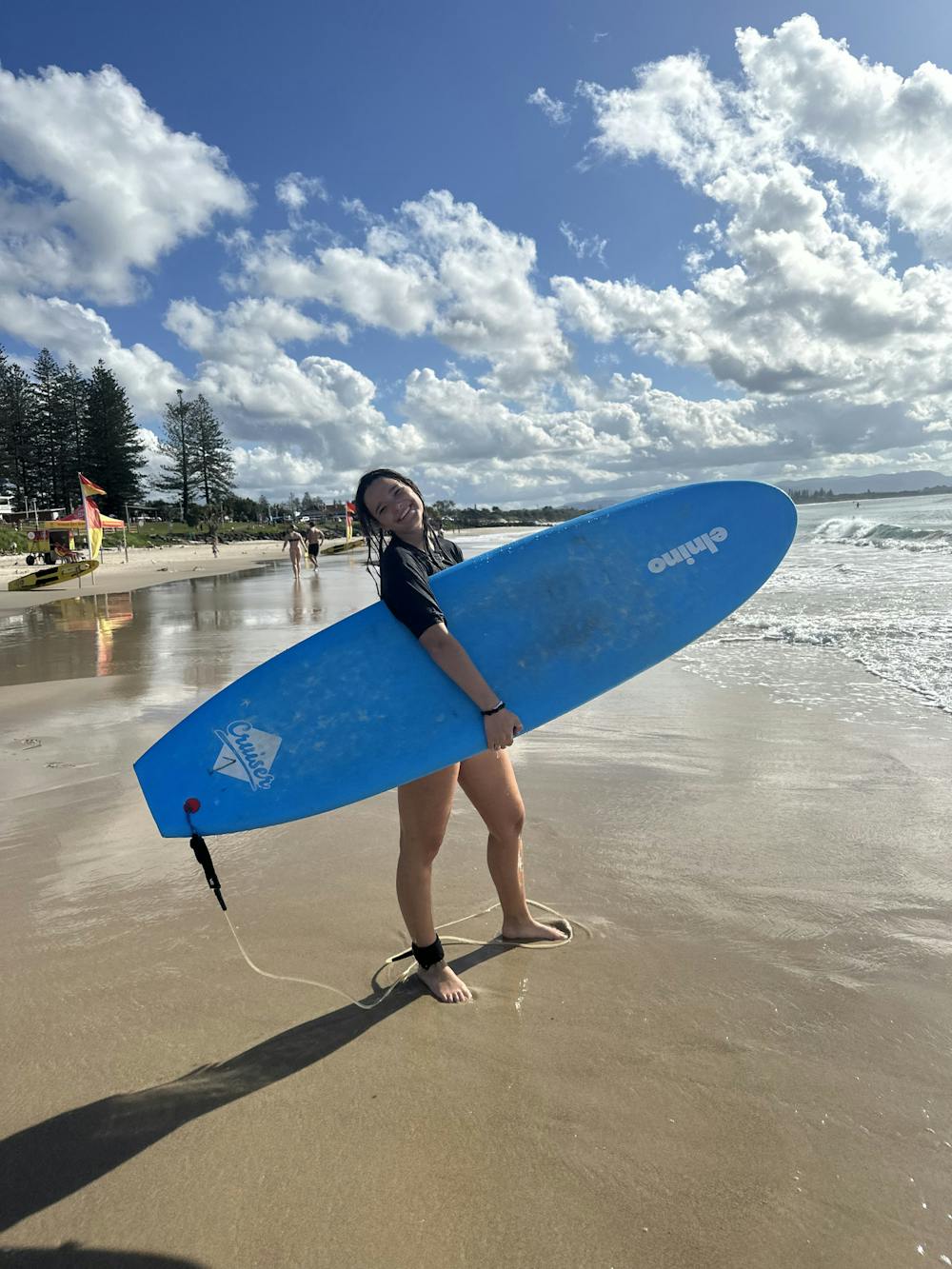I had an extremely difficult time adjusting to life halfway around the world. The first month in Sydney, Australia was isolating and discouraging. I failed to connect with peers, struggled with the 400-person lectures and felt an intense amount of envy as my friends back home continued their weekly poker nights and late night Cookout runs without me. Fortunately, I took risks and eventually stepped out of my comfort zone which allowed me to find a solid friend group that completely turned my time abroad around.

The Sydney Opera House at night, on June 29, from the perspective of a Sydney Harbour Ferry. Photo courtesy of Halli Harwood.
Hands down, studying abroad was the best experience of my entire life. I never knew I had the capacity to appreciate and miss the experience as much as I do. I had five months of absolute autonomy and a long list of life lessons that made my time in Australia freeing and full of growth. While I was learning to surf, snorkeling alongside sea turtles and people watching from the steps of the Opera House, I was simultaneously engaging in cultural activities and connecting with other students from around the world.
Nick Gozik, Elon’s dean of global education, echoed this sentiment and acknowledged that it can sometimes take months or years for students to truly understand the benefits associated with studying abroad.
“Common learning outcomes include a greater sense of independence, adaptability, cross-cultural awareness and disciplinary knowledge,” Gozik said.
However, Elon University was, and still is, my dream school. It was the 10th and final school I visited during my college search and I instantly had a gut feeling that I belonged here. While there have been times when I have questioned that, the feeling of belonging always returns stronger than the previous time.
But, I am in the middle of that questioning time right now. I was excited to return to my friends, to my clubs, to my new internship and job and to normal classes. I have since learned that the things I disliked or thought were weird in Sydney are the things that I now miss dearly.
On the University of Sydney’s campus, the teaching felt so impersonal. I felt invisible. Now, I miss the anonymity of those spaces. I was never required to speak up for participation points or forced to engage in uncomfortable icebreakers. When I had to carve an extra 30 minutes of commute time into my schedule so I could get to classes on time, I missed the intimacy of Elon’s brick pathways. Now, I yearn for those long walks when I would take time to plan out my adventures for the weekend or call my Mom to catch up. I miss that a scoop of ice cream would be added to my “iced coffee” orders, which was something that I originally found strange. Similarly, I miss the fact that most coffee shops would close in the early afternoon because it promised the idea of work-life balance that is present in Australia, but lacking in America.

Harwood poses with a surfboard on May 29 after surfing at Byron Bay. Photo courtesy of Halli Harwood.
I miss the access to all types of public transportation — from buses to trains to ferries — and the idea of living in a walkable city. I miss feeling safe, even when heading home from late-night events alone at 2 a.m., much to the dismay of my parents. I miss getting bluntly asked about my thoughts on the American political system, especially because I thought it was intrusive at the time. I miss being able to attend class and be at the beach within the next hour — frozen yogurt in hand. I miss being able to book $30 flights and see wildlife that I had never seen, let alone heard of, before. I especially miss the conversion rate between American and Australian currency.
Gozik shared that students adjust differently to reentry on Elon’s campus and that Elon believes reentry is just as important to the study abroad experience as pre-departure and being overseas. In an effort to alleviate some of the stressors associated with returning from abroad, Elon offers a variety of resources.
“Finding spaces for reflection can be really valuable,” Gozik said. “A lot of work has been done to help faculty assist students in their reflection.”
Students have the opportunity to serve as Global Ambassadors, a program in which they can share their abroad experiences during class visits and panel discussions, as well as take courses designed for reflection and analysis — such as “Coming Home: The Impact of Studying Abroad.”
As dramatic as it sounds, I am in the process of grieving the experience of a lifetime. Those five months were extremely transformative and, just like that, I’m back to what my parents refer to as “real life,” with legitimate commitments that I am required to honor.
Elon is known for their study abroad programs and roughly 88% of students go abroad in some capacity before graduating. Yet, I had never heard other people discuss the challenges they faced when they returned. I knew the adjustment to Sydney was going to be rough, between not knowing anyone else going, the time change and the difference in academic structure. But I never anticipated the heaviness associated with the end of a program — of what is now just a collection of fond memories. Luckily, I know I will find my place on Elon’s campus and the feeling of belonging will return. After all, it was Elon that gave me the opportunity to study abroad in the first place.


